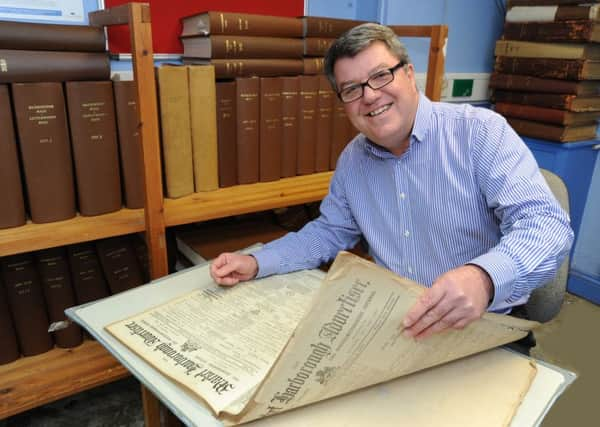John's WWI blog: Shocking trench tales and a dead donkey


Tabloid-style news which used to dominate the pre-war Market Harborough Advertiser returns for the January 18, 1916, edition.
There’s news of a soldier rendered mute by shell shock and then recovering his power of speech after a wedding reception while on leave; a company of soldiers who mysteriously disappeared in Gallipoli without a trace; the horrifyingly vivid description of two German aviators who burned alive when their plane was shot down in Russia; and the remarkable rescue of two men trapped in a well in Kibworth.
Oh, and the death of a ‘famous donkey’.
SOLDIER’S SPEECH RESTORED
Advertisement
Hide AdAdvertisement
Hide AdA Liverpool soldier ‘was rendered deaf, blind and dumb by the explosions of German Jack Johnson shells in a battle early in the summer’, says a story on page 4.
He regained his sight and hearing but was still mute when he attended two wedding in his native city on New Year’s Eve. Tired out after all the dancing he sat down to rest. “There he yawned and to his surprise ejaculated a long-drawn ‘Oh’.
“It was the first sound that had escaped his lips since the battle. He called out to a friend and found that his voice was completely restored.”
UNSOLVED MYSTERY OF GALLIPOLI
The disappearance of 260 men and officers from 1/5th Norfolk Territorials after attacking Turkish positions had even come to the attention of the King, says the Advertiser.
Advertisement
Hide AdAdvertisement
Hide Ad“Despite all inquiries, nothing can be heard of the missing officers and men. The next day Red Cross workers went over the ground and the only trace of them which could be found was two small pocket-books belonging to a captain.
“They were sent home and are the only memorials left of their brilliant charge.”
END OF A GERMAN ALBATROSS
The Advertiser publishes a Russian journalist’s account of a German plane being shot down. “For some time the Albatross cut its way down with the speed of an arrow, and then flared up like a torch. It seemed that the pilot in the gondola of whose machine Death had entered as a passenger, was attempting by a supreme effort to extinguish the flames.”
But the plane crashed to the ground among the Russian soldiers and the aviators were still trapped in their seats in the flaming wreckage. “It was evident that the men were being burnt alive, but our people were unable to save them,” says the story.
Advertisement
Hide AdAdvertisement
Hide Ad“The flames were roaring round them and our soldiers thrust their long lances into the fire in order to remove parts of the blazing apparatus but their efforts were in vain.
“Blackened arms waved to and fro and clutched the lances and tortured human bodies withered in anguish.”
The description continues: “Men whose nerves had been hardened by continuous fighting could not bear to see the aviators perishing.”
Eventually the plane blew up and the plaintive cries of the trapped airmen were silenced. “Nothing was heard but the roaring of the burning benzene and a horrible hissing sound.”
NARROW ESCAPE OF MEN IN A WELL
Advertisement
Hide AdAdvertisement
Hide AdSomewhat closer to home in Kibworth was the news that ‘through the pluck and skill of George Oldershaw of Wigston, what might have been a double fatality was prevented’.
George’s brother and a fellow workman had been at the bottom of a well they had been sinking in Wistow Road when they both collapsed, apparently overcome from gas.
George tried once to lower himself down to rescue them but only just managed to get back up before he was overcome by gas too.
“At the top he bound a wet rag round his mouth and going down again succeeded in tying a rope round the workman and so enabling him to be drawn up.”
Then George returned a third time to rescue his brother.
FAMOUS DONKEY DIES
Advertisement
Hide AdAdvertisement
Hide AdAnd finally, Jacob the donkey, a favourite of crowned heads and numerous other royalties of England and European countries visiting Carisbrooke Castle on the Isle of Wight, has died.
The story says: “Jacob had been drawing water from the castle well by means of a large wheel in the interior of which he kept treading. He was also a favourite with visitors from all over the world.”